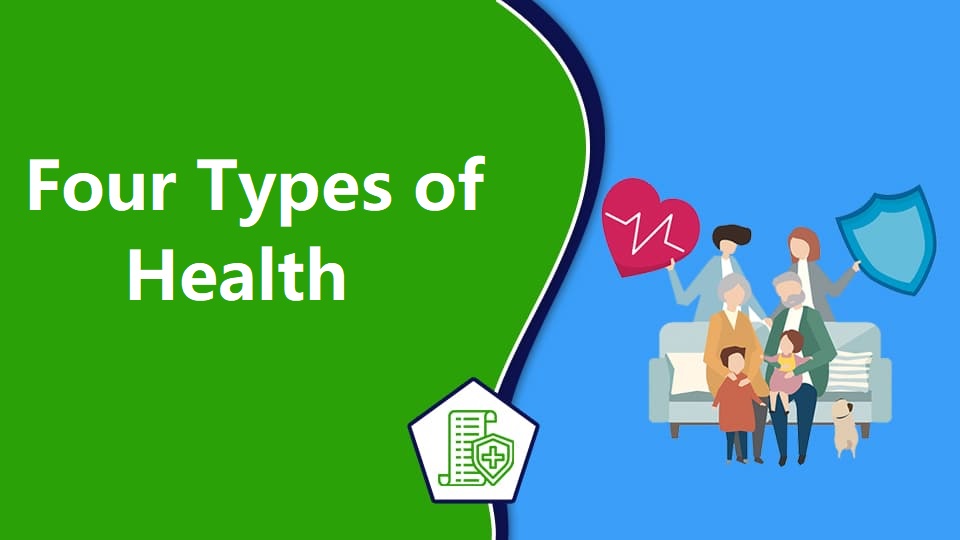What are the Four Types of Health 2026

Health is a complex concept with numerous dimensions. While we often think of health in purely physical terms, experts have identified four key types of health that provide a more holistic view of well-being. Getting the right balance between these four spheres can lead to overall health, happiness, and personal fulfillment. Understanding this integrated health model is the first step in living a more balanced, meaningful life.
Disclaimer: The content in this article is intended for general informational purposes only and does not constitute professional medical advice. Consult a doctor regarding any changes to your health routine.
Below is the list of Four Types of Health
Physical Health

Physical health refers to the effective functioning of our bodies. This includes having the energy to engage in daily activities, proper nutrition to fuel our work, strong cardiorespiratory health, sufficient muscular strength, a healthy body mass index, and avoidance of disease. Engaging in regular exercise, eating a nutritious diet, getting adequate sleep, and making positive lifestyle choices all contribute to robust physical health.
Some key markers of ideal physical health are:
- Body mass index (BMI) between 18.5 and 24.9 – BMI measures body fat based on weight and height. Keeping BMI in the healthy range reduces disease risks.
- Resting heart rate of 60-100 bpm – Lower resting heart rates mean the heart muscle is efficient and strong.
- Blood pressure <120/80 mmHg – Ideal blood pressure reduces strain on blood vessels and organs.
- VO2 max levels for your age/gender – VO2 max measures oxygen processed during exercise. Higher levels translate to better cardiorespiratory fitness.
- Healthy cholesterol, blood sugar, hormone levels, etc. – Getting annual physicals and testing can uncover issues early.
- 150+ minutes moderate or 75+ minutes vigorous activity per week – Meeting exercise guidelines keeps the heart, lungs, muscles, and metabolism functioning optimally.
Making physical health a priority with good lifestyle habits leads to increased longevity, improved strength and mobility, abundant energy, sharper mental clarity, and greatly reduced risk of most chronic diseases.
Mental Health

Mental health refers to cognitive, behavioral, and emotional well-being. It impacts how we think, feel, and make decisions in response to life’s daily ups and downs. Robust mental health leads to productive activities, fulfilling relationships, the ability to adapt to change and cope with adversity, and overall enjoyment of life.
Some aspects of positive mental health include:
- Emotional stability and resilience – Ability to navigate stressors without extreme reactions or behaviors
- Realistic optimism and positive attitude – Seeing the good without ignoring challenges
- Healthy self-image and self-confidence – Believing in one’s competence and self-worth
- Self-discipline and strong values – Establishing boundaries and working towards meaningful goals
- Flexibility and ability to compromise – Adapting preferences to maintain harmony with others’ needs
- Coping skills and tools to address disorders – Effectively managing conditions like anxiety, depression, trauma, addictions, etc.
Making mental health a priority with lifestyle choices, developing coping mechanisms, seeking treatment when needed, and building a strong support network leads to inner peace, rewarding interpersonal connections, career successes, and a greater sense of purpose.
Social Health

Social health revolves around establishing meaningful connections with others in our world. This can involve relationships with intimate partners, family members, friends, neighbors, colleagues, casual acquaintances, or community members. Social connections provide a sense of belonging, opportunities to give and receive support, and avenues for service to others.
Some elements of healthy social functioning include:
- At least 3-5 close connections – Maintains intimacy through honesty, reliability, care, and trust.
- Broader social networks – Develop a sense of belonging by exchanging ideas and participating in groups.
- Communication competence – Demonstrates respect, listening skills, assertiveness, and conflict resolution.
- Supports others and contributes – Adds value through cooperation, reciprocity, volunteerism, mentorship, etc.
- Cultural awareness and respect – Appreciates diverse perspectives found across humanity.
- Work/life balance – Makes time for both personal and professional social circles.
Prioritizing social health leads to loving support systems, expanded perspectives, meaningful contributions, and a greater sense of connection and community across one’s lifespan.
Spiritual Health

Spiritual health refers to the personal quest to find meaning and purpose in life. This involves exploring beliefs about morality, humanity, and our place in the universe. Spirituality provides a framework for understanding birth, life, death, and existence on a cosmic scale. It can influence decision-making, provide moral guidance, and prompt transcendent experiences.
For some, spiritual health revolves around religion and practicing faith-based rituals and traditions. Others find spirituality through connecting with nature, serving a humanitarian cause, or pondering philosophical questions.
Some key aspects of spiritual wellness include:
- Pursuing meaningful goals – Seeking to make a positive difference based on one’s worldview of what matters most.
- Considering existential questions – Contemplating origin stories, afterlife beliefs, or theories of existence.
- Seeking personal fulfillment – Engaging in work, hobbies, relationships, and causes that provide inner peace, growth, joy, and vitality.
- Practicing traditions – Participating in rituals, ceremonies, or community-related to a chosen belief system.
- Transcendent experiences – Having moments of awe, intense presence, oneness with the universe, or perceived mystical events.
Strengthening spiritual health provides principles to live by, tools to overcome adversity, a perceived connection to things larger than self, and, for some, brings a relationship with a higher power or Supreme Being.
Achieving Complete Health
While breaking down overall health into four components makes each one easier to understand, we must keep in mind that they all impact each other simultaneously. The mind affects the body, relationships shape perspectives, behavior aligns with beliefs, and so on in an endless dance.
To achieve sustainable wellness, it is essential to:
- Assess all four areas – Identify strengths and growth opportunities in each sphere.
- Set realistic, measurable goals – Target specific habits to establish over time.
- Leverage relationships – Allow trusted individuals to provide support and accountability.
- Be patient – Progress often happens gradually with some setbacks.
- Practice self-care – Monitor stress levels and take breaks to avoid burnout.
- Celebrate small wins – Note accomplishments along the winding path.
Besides assessing and improving these four spheres, it is important to identify the connections BETWEEN them for maximum impact. For example, establishing a consistent meditation practice can positively impact mental, spiritual, AND social health simultaneously. Regularly attending religious services can benefit spiritual, mental, AND social health all at once. Examining how improved habits in one area affect other aspects of health helps strategically build complementary strategies that maximize growth across all four domains.
The integrated health model provides a blueprint for building a lifestyle that fuels total well-being. As we better understand the diverse components of health and how they interact, each of us has the opportunity to pursue lasting physical vitality, emotional wisdom, social connections, and spiritual growth. What area of health do you think needs more attention in your own life? Focusing on that while also maintaining balance across categories can help you thrive more completely. Here’s to health, happiness, meaning, and purpose!
Frequently Asked Questions
Q. What are some examples of physical health habits I can work on improving?
Some great habits to boost physical health are simple lifestyle tweaks like improving your diet to emphasize whole foods high in nutrients, establishing a regular cardio and strength training program 3-5 times per week, aiming for 7-9 hours of quality sleep nightly, reducing recreational screen time to refresh your mind, and drinking more water to stay hydrated.
Q. Is mental illness the opposite of mental health?
No – mental health exists on the spectrum, and many psychiatric diagnoses can be well-managed to still live a mentally healthy life characterized by positive emotions, resilience, balance, productivity, and meaningful relationships. Those with mental illness can greatly benefit their overall mental health through professional treatment plans and self-care strategies.
Q. Do I need to believe in God or attend religious services if I want good spiritual health?
Not necessarily. Spiritual health revolves around finding meaning, purpose, ethics to live by, and peace through the exploration of existential questions. For some,e that occurs through traditional religions and practices, for others, it can be seeking truth by studying nature or philosophy. Spiritual health is highly personal.
Q. I spend lots of time chatting and texting friends – does that count as social health?
While digital communication is part of most friendships, investing in face-to-face social connections is vital for mental and physical health benefits. Go deeper by trying phone calls, sharing activities/hobbies, hosting gatherings, and being fully present during interactions. Prioritize making time for those closest to you as well.
Conclusion
Ultimately, living a long, energized, purposeful life with close relationships results from caring for all four integrated facets of health. Strive for vigorous physical activity to power the body, mental resilience to roll with life’s ups and downs, deep social bonds to weather storms together, and spiritual alignment to foster meaning and transcendence. Identifying areas for growth and establishing incremental goals over time can lead to comprehensive well-being and an enduring sense of fulfillment.



